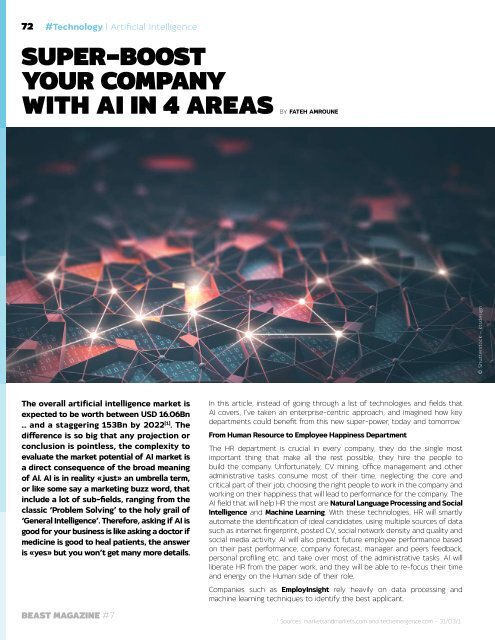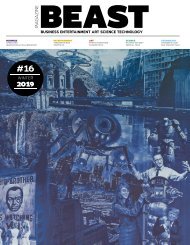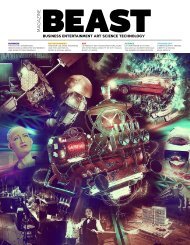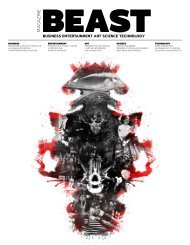BEAST #7
Create successful ePaper yourself
Turn your PDF publications into a flip-book with our unique Google optimized e-Paper software.
72 #Technology | Artificial Intelligence<br />
#Technology | Artificial Intelligence 73<br />
SUPER-BOOST<br />
YOUR COMPANY<br />
WITH AI IN 4 AREAS BY<br />
FATEH AMROUNE<br />
The overall artificial intelligence market is<br />
expected to be worth between USD 16.06Bn<br />
… and a staggering 153Bn by 2022 [1] . The<br />
difference is so big that any projection or<br />
conclusion is pointless, the complexity to<br />
evaluate the market potential of AI market is<br />
a direct consequence of the broad meaning<br />
of AI. AI is in reality «just» an umbrella term,<br />
or like some say a marketing buzz word, that<br />
include a lot of sub-fields, ranging from the<br />
classic ‘Problem Solving’ to the holy grail of<br />
‘General Intelligence’. Therefore, asking if AI is<br />
good for your business is like asking a doctor if<br />
medicine is good to heal patients, the answer<br />
is «yes» but you won’t get many more details.<br />
In this article, instead of going through a list of technologies and fields that<br />
AI covers, I’ve taken an enterprise-centric approach, and imagined how key<br />
departments could benefit from this new super-power, today and tomorrow.<br />
From Human Resource to Employee Happiness Department<br />
The HR department is crucial in every company, they do the single most<br />
important thing that make all the rest possible, they hire the people to<br />
build the company. Unfortunately, CV mining, office management and other<br />
administrative tasks consume most of their time, neglecting the core and<br />
critical part of their job; choosing the right people to work in the company and<br />
working on their happiness that will lead to performance for the company. The<br />
AI field that will help HR the most are Natural Language Processing and Social<br />
Intelligence and Machine Learning. With these technologies, HR will smartly<br />
automate the identification of ideal candidates, using multiple sources of data<br />
such as internet fingerprint, posted CV, social network density and quality and<br />
social media activity. AI will also predict future employee performance based<br />
on their past performance, company forecast, manager and peers feedback,<br />
personal profiling etc. and take over most of the administrative tasks. AI will<br />
liberate HR from the paper work, and they will be able to re-focus their time<br />
and energy on the Human side of their role.<br />
Companies such as EmployInsight rely heavily on data processing and<br />
machine learning techniques to identify the best applicant.<br />
© Shutterstock - ktsdesign<br />
A Company like Onfido also uses internet and AI to process background<br />
checks more quickly and effectively than ever.<br />
From Customer Service to User Delight Department<br />
If HR own the first interaction with employee, the Customer Service<br />
department owns the other critical first interaction, the one with<br />
customer. Its quality can make or break a company. Therefore, being on<br />
the top of your game can change the destiny of your company. Here,<br />
two fields of AI may generate a decisive advantage; Natural Language<br />
Processing and Social Intelligence. With a market expected to grow<br />
at a CAGR of more than 37% between 2017 and 2021 according<br />
to BusinessWire, Global Chatbot is the flagship of Natural Language<br />
Processing. Chatbots combined with Social Intelligence may disrupt<br />
the customer service for ever. This technology will allow companies<br />
to offer instant and customized responses to any customer on any<br />
device at any time<br />
Chatbot is a bourgeoning space with multiple actors from very big<br />
companies such as Microsoft to startups such as Anboto and Nuance,<br />
two promising companies offering a performant Chatbot dedicated to<br />
Customer Service.<br />
From Marketing to Financial Scenario Department<br />
There’s a famous quote about Marketing stating «the main problem<br />
of marketing campaign is that 50% of their campaign fails, but noone<br />
knows which half». Marketing is both a science and an art,<br />
but it may definitely turn into a science sooner rather than later.<br />
Advanced capabilities such as Machine Learning, Natural Language<br />
Processing, applied statistics among other techniques pave the<br />
way to a new field called the prescriptive analytics. It goes a step<br />
ahead of predictive analytics in the sense that this technology also<br />
suggests the best actions to initiate to take advantage of the future<br />
as perceived. With this technology in hand, a marketer becomes a<br />
man with super-powers, as he will have the power to visualise, make<br />
scenarios and act on the future (only concerning their product sales<br />
and not the lottery…). The principle is quite simple. Sales output<br />
means a direct outcome of millions of inputs (external or internal),<br />
and if you have access to this input, with enough power to process it<br />
and the right algorithm to learn and refine the model, then you can<br />
predict the sales outcome more precisely than ever. An unexpected<br />
outcome might be the merge of finance and marketing functions in<br />
the near future.<br />
«Fateh Amroune is the founder of Kemada, a consulting company<br />
in digital transformation, and co-founder of Singular Intelligence,<br />
an Oxford-based start-up specialized in AI and prescriptive<br />
analytics. Serial entrepreneur with over 18 years of<br />
experience in software industry and an Oxford<br />
graduate in Strategy and Innovation, Fateh is<br />
passionate about the impact of technologies on<br />
businesses.»<br />
Interested in this field? If you just play it safe, you can try IBM<br />
or Nielsen Quick. If you are an investor or an early adopter<br />
have a look at Singular Intelligence for their prescriptive<br />
analytics solution or Talkwalker for their AI powered solution<br />
offering advanced market knowledge.<br />
From Top Management to General Intelligence Management<br />
Does having a robot in your board of director sound like<br />
science fiction? In fact, it has already happened as a<br />
robot called Vital was named director by a Hong Kong<br />
venture capital in 2014. In 2016, Tieto, a Nordic company<br />
also appointed an Artificial Intelligence as a member of<br />
the leadership team. The rise of AI in these two cases is<br />
largely due to the nature of the companies which are heavily<br />
data-driven. The underlying technology for those two AI is<br />
prescriptive analytics. But there’s an even bigger jump that<br />
may happen, the combination of several AI sub-fields such<br />
as prescriptive analytics, NLP, creativity processing, social<br />
intelligence and planning all packaged in one will generate<br />
what we call «general intelligence», an artificial intelligence<br />
able to surpass Humans in all cognitive aspects and able to<br />
understand the human impact of the decision.<br />
General Intelligence technology is mostly studied in universities<br />
such as Cambridge or MIT but there are two noticeable startups<br />
working on a commercially viable General Intelligence<br />
solution: the first is KIMERA with Nigel and the second is<br />
Maluuba which was recently acquired by Microsoft.<br />
Any technology that can reproduce automatically a human<br />
reasoning is by definition Artificial Intelligence in that sense AI<br />
can be dated back to the mid-1600 and the first calculating<br />
machine. That is why AI is a moving target, what we’ve called<br />
today AI will be just simple technology tomorrow. That is<br />
also why AI will remain a greenfield world with millions of<br />
possibilities but we should not be blurred by the buzzword<br />
and trends, we should put the technology aside, think value<br />
proposition and reframe our ambition. As a rule of thumb, use<br />
the value 10, and force yourself to ask over ambition goals:<br />
how can I divide my costs by 10? How can I build this product<br />
10 times faster? How I can multiply my sales by 10? This<br />
way of thinking will force the company to put aside the old<br />
processes leading to incremental progress and think about<br />
disruptive innovation (at organisation,<br />
business and technology levels).<br />
Only then you can start thinking<br />
about how AI, or any other<br />
technology, can help you.<br />
<strong>BEAST</strong> MAGAZINE <strong>#7</strong><br />
1<br />
Sources: marketsandmarkets.com and techemergence.com - 31/03/1

















